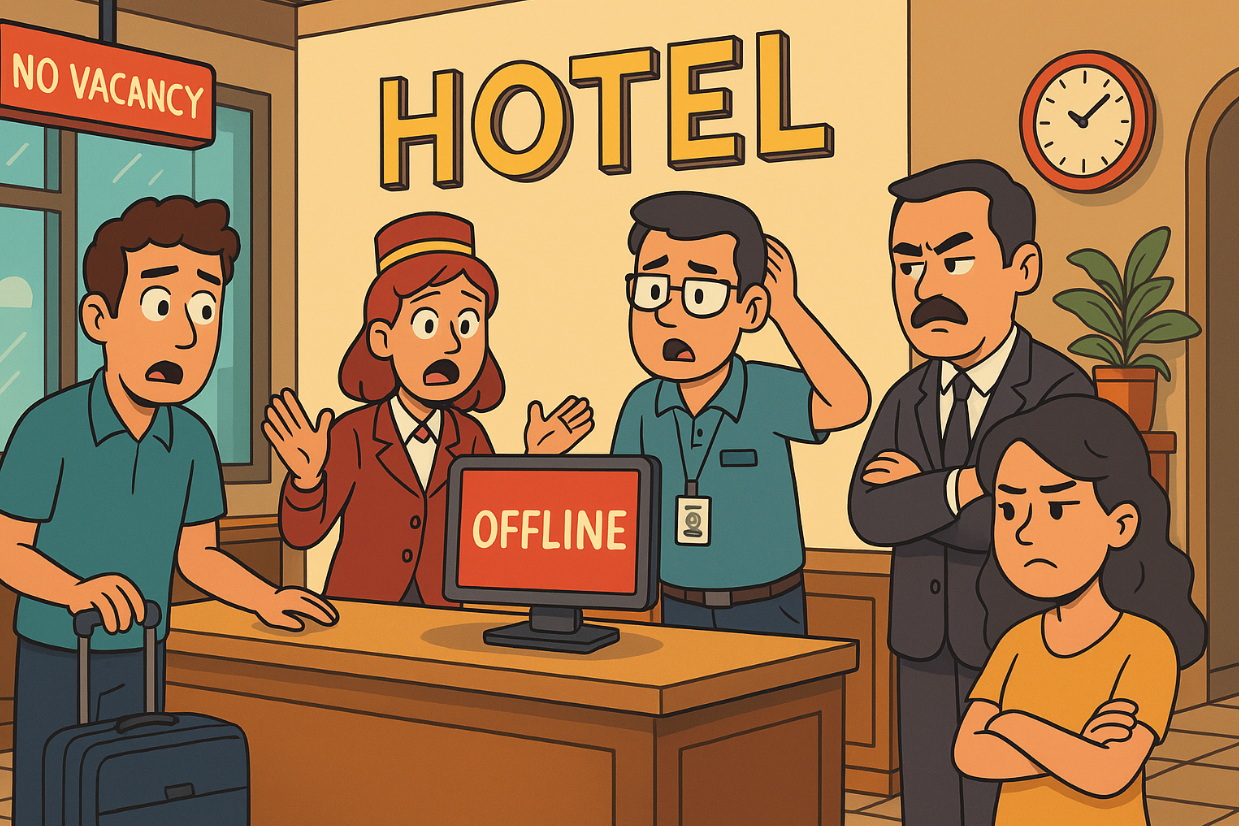Canadian Hospitality Group Restores Operational Efficiency After Unifying Fragmented Managed IT and Guest Systems
The Challenge
BlueWave Hospitality Group, a mid-sized Canadian hotel and resort chain, faced recurring disruptions across its digital operations following years of decentralized IT outsourcing. The organization had contracted multiple vendors to manage property management systems (PMS), guest Wi-Fi networks, reservation platforms, and payment processing. However, the absence of a unified oversight model led to duplicated costs, inconsistent service levels, and prolonged outages that disrupted both guest experiences and business continuity.
When a key property management database crashed during peak tourist season, none of the vendors assumed ownership of the issue. Check-in systems froze, reservation data was inaccessible, and online bookings failed for over 48 hours. The incident caused revenue losses exceeding $800,000, alongside significant reputational harm.
An internal audit revealed fragmented monitoring, lack of escalation procedures, and inconsistent application of privacy controls across third-party service providers. Some vendors had access to sensitive guest and payment data without proper contractual safeguards or alignment to the Personal Information Protection and Electronic Documents Act (PIPEDA). This raised regulatory and insurance compliance concerns, highlighting the urgent need for centralized managed operations governance.
Our Solution
Our Managed Services and Operations team was engaged to design and implement a Unified Hospitality Managed Operations Framework, ensuring consistency, visibility, and accountability across all IT and guest service systems.
The engagement began with a full operational assessment across hotel properties, corporate offices, and third-party systems. Based on these findings, we consolidated all service delivery under a single governance structure supported by standardized service-level agreements (SLAs) and centralized oversight.
Key initiatives included:
By creating a structured and auditable operational ecosystem, BlueWave transitioned from reactive issue management to predictive service assurance.
- Establishment of a Hospitality Operations Center (HOC): providing 24/7 monitoring of all digital systems—property management, reservations, POS, and Wi-Fi.
- Migration to a unified IT Service Management (ITSM) platform: centralizing ticketing, change management, and compliance tracking across vendors.
- Implementation of vendor performance scorecards: linking SLA compliance to measurable KPIs such as uptime, incident response time, and PIPEDA adherence.
- Automation of maintenance, patching, and data backups: to ensure reliability and reduce manual intervention errors.
- Deployment of privacy and access control policies: governing third-party service providers with PIPEDA and PCI DSS alignment.
- Proactive compliance auditing: integrating quarterly vendor reviews and continuous monitoring of service reliability.
The Value
Within eight months of implementation, BlueWave Hospitality achieved measurable improvements in stability, compliance, and guest satisfaction: This transformation positioned BlueWave as a technology-resilient, privacy-conscious hospitality leader, capable of delivering consistent digital experiences to guests nationwide.
- 80% reduction in downtime incidents across digital systems.
- Mean Time to Resolution (MTTR) improved from 9 hours to under 90 minutes.
- 100% alignment with PIPEDA and PCI DSS through vendor compliance consolidation.
- Seamless collaboration between IT, operations, and vendor teams through the unified ITSM platform.
- Renewal of cyber insurance coverage without premium increases.
- 15% increase in guest satisfaction scores related to digital services reliability.
Implementation Roadmap
1. Assessment (Weeks 1–3): Review vendor contracts, service dependencies, and incident response processes.
2. Framework Design (Weeks 4–6): Develop unified Managed Operations Framework, define escalation hierarchy, and establish SLA metrics.
3. Deployment (Weeks 7–12): Implement centralized HOC, migrate all workflows to ITSM, and standardize incident and change management.
4. Optimization (Weeks 13–16): Introduce automated maintenance and backup verification; launch vendor scorecard tracking.
5. Continuous Improvement (Ongoing): Conduct quarterly operational performance reviews, compliance audits, and vendor governance evaluations.


